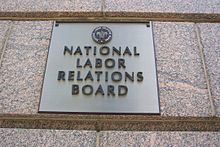
NLRB Gets Institutional Religious Freedom Wrong Again
The National Labor Relations Board is charged by law with protecting the right of workers to collective bargaining and unionization. It is required by the US Constitution, and by the Religious Freedom Restoration Act, to protect the freedom of religious organizations and persons to exercise their religion. A unionized workforce has real power that it can deploy against the policies of an employer. So what is the NLRB to do when employees of a religious employer seek to join a union? If it protects the unionizing effort, it will be helping to erode the ability of the religious employer to determine and ensure that the organization follows its religious mission. Of course, the workers may never act in such a way; nevertheless, the NLRB is required to stay away from policies and decisions that could erode the religious freedom of the religious organization.
The NLRB accepts that constitutional limitation, or at least claims to. In practice, it seems determined to be as little restricted as it can get away with, even though various past pro-union/anti-religious employer decisions have been sharply rebuked by the courts, including the US Supreme Court. The main battleground has been unionization efforts by faculty at religious higher education campuses. The latest episode, and the latest mistaken NLRB decision, concerns an effort to unionize adjunct (not regular) faculty at Pacific Lutheran University (PLU).
In its December 16, 2014, decision, the NLRB ruled on two issues. Much of the written decision is taken up with deciding how to determine which faculty are “managerial” and thus not eligible for unionization at all. The other important issue concerned whether the NLRB could assert jurisdiction or instead must keep its hands off because PLU is a religious organization.
The Board rightly ruled that there is abundant public evidence that PLU holds itself out as a religious university, backing away from flawed past efforts to discern whether particular universities or colleges are religious enough in the eyes of NLRB staff to be outside its jurisdiction. But this welcome progress was immediately nullified by the Board’s creation of a second level of inquiry: whether (in the Board’s view) particular faculty members are sufficiently central to the religious mission of the university to be treated as religious rather than secular.
If some faculty at a religious university are selected and function no differently than faculty at a secular university are selected and function, then, according to the NLRB decision, it is allowed to reach into the religious university and assert its jurisdiction over those non-religious faculty, authorizing them to join a union if they so choose.
And yet, as several amicus briefs, and the lengthy and powerful dissent by NLRB member Harry Johnson, point out, this kind of line-drawing is exactly what the US Supreme Court unanimously rejected in its 1987 decision, Corporation of the Presiding Bishop v. Amos. That case concerned similar issues regarding employees and religious employers under Title VII of the 1964 Civil Rights Act.
In 1972, Congress had modified the religious exemption of Title VII so that a religious employer is free to consider religion when choosing people for any and all staff positions. A janitor who was fired for religious reasons by a Mormon health club challenged this modification: how could his religion be relevant to being a janitor? The Supreme Court took the other side: it cannot be right for the government to force a religious employer to guess whether a judge will agree with the employer’s classification of one job position or another as religious.
By exempting the entire religious organization from the prohibition against considering religion when staffing, the Title VII exemption keeps the government out of the internal decisions of religious employers and prevents the government from creating a concept of religion to apply when it examines the practices and beliefs of religious employers. In sharp contrast, the NLRB has now gone the other direction: by not exempting Pacific Lutheran University as a whole, even after conceding it is a religious university, the NLRB has forced itself to create its own concept of what is appropriate for a faculty member at a religious university-a concept that goes against what PLU itself believes, and which was thoroughly demolished in member Johnson’s dissent.
Time for the federal courts to overrule the NLRB yet again.
